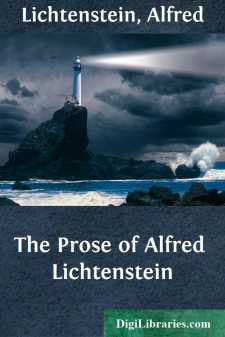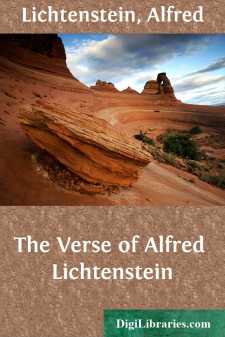Categories
- Antiques & Collectibles 13
- Architecture 36
- Art 48
- Bibles 22
- Biography & Autobiography 813
- Body, Mind & Spirit 142
- Business & Economics 28
- Children's Books 15
- Children's Fiction 12
- Computers 4
- Cooking 94
- Crafts & Hobbies 4
- Drama 346
- Education 46
- Family & Relationships 57
- Fiction 11829
- Games 19
- Gardening 17
- Health & Fitness 34
- History 1377
- House & Home 1
- Humor 147
- Juvenile Fiction 1873
- Juvenile Nonfiction 202
- Language Arts & Disciplines 88
- Law 16
- Literary Collections 686
- Literary Criticism 179
- Mathematics 13
- Medical 41
- Music 40
- Nature 179
- Non-Classifiable 1768
- Performing Arts 7
- Periodicals 1453
- Philosophy 64
- Photography 2
- Poetry 896
- Political Science 203
- Psychology 42
- Reference 154
- Religion 513
- Science 126
- Self-Help 84
- Social Science 81
- Sports & Recreation 34
- Study Aids 3
- Technology & Engineering 59
- Transportation 23
- Travel 463
- True Crime 29
Alfred Lichtenstein
Alfred Lichtenstein (1889–1914) was a German Expressionist writer and poet, known for his vivid and often grotesque depictions of modern urban life. His work captured the angst and absurdity of existence, influenced by the social unrest and tensions of pre-World War I Europe. One of his most famous works is the poem "Die Dämmerung" ("Twilight"), which exemplifies his pessimistic and darkly humorous style. Lichtenstein tragically died at the age of 25 during World War I, leaving behind a brief but influential body of work that resonated with the disillusionment of his generation.
Author's Books:
Sort by:
The Winner Max Mechenmal was an independent manager of a newspaper kiosk. He ate and drank well; he had relations with many women, but he was careful. Because his salary was insufficient, he occasionally permitted himself to take money from Ilka Leipke. Ilka Leipke was an unusually small, but well-developed, elegant whore, who attracted many men and women with her bizarre nature and apparently silly...
more...
I Because I believe that many do not understand the verse ofLichtenstein, do not correctly understand, do not clearly understand— II The first eighty poems are lyric. In the usual sense. They are not much different from poetry that praises gardens. The content is the distress of love, death, universal longing. The impulse to formulate them in the "cynical" vein (like cabaret songs) may, for...
more...



